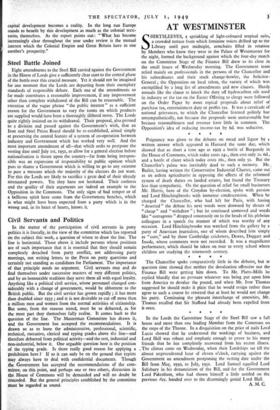Steel Battle Joined
Eight amendments to the Steel Bill carried against the Government in the House of Lords give a sufficiently clear start to the central phase of the battle over this crucial measure. Yet it should not be imagined for one moment that the Lords are departing from their exemplary standards of responsible debate. Each one of the amendments so far made constitutes a reasonable improvement, if any improvement other than complete withdrawal of the Bill can be reasonable. The retention of the vague phrase " the public interest " as a sufficient reason for the Government to vary the terms on which products are supplied would have been a thoroughly illiberal move. The Lords quite rightly insisted on its withdrawal. Their proposal, also pressed to a division and passed against the Government's wish, that an Iron and Steel Prices Board should be re-established, aimed simply at preserving the central feature of a system of co-operation between industry and Government which has worked very well. And the most important amendment of all—that which seeks to postpone the vesting date until July 1st, 1951, to allow for a general election before nationalisation is thrust upon the country—far from being irrespon- sible was an expression of responsibility to public opinion which puts to shame a Government which is willing to go to any extreme to pass a measure which the majority of the electors do not want. For this the Lords are likely to sacrifice a great deal of their already attenuated powers. Yet they have not hesitated. Their coolness and the quality of their arguments arc indeed an example to the Opposition in the Commons. The only signs of -bad temper or of a bellicose spirit have come from the Government benches, which is what might have been expected from a party which is in the wrong and, in its heart of hearts, knows it.






































 Previous page
Previous page